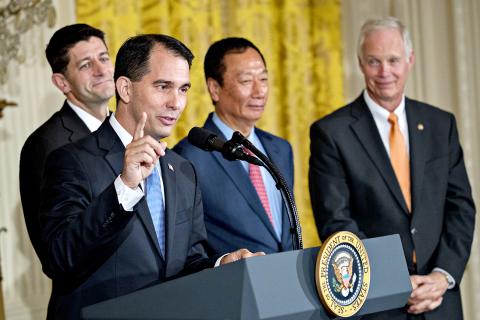Hon Hai Precision Industry Co (鴻海精密), known as Foxconn Technology Group (富士康) outside of Taiwan, on Wednesday announced plans to build a US$10 billion LCD panel plant in Wisconsin, a deal US President Donald Trump said would not have happened without his efforts.
The company said it plans to invest US$10 billion over four years to build a 1.86 million square meter plant that could employ up to 13,000 people.
Trump praised Hon Hai chairman Terry Gou (郭台銘) at a White House event, saying: “If I didn’t get elected, he definitely wouldn’t be spending US$10 billion... This is a great day for America.”

Photo: Bloomberg
Wisconsin Governor Scott Walker said that his state would award US$3 billion in incentives, and was to sign a memorandum of understanding on the investment yesterday.
The state legislature would need to approve the package, he said, adding that about half is for capital costs and nearly half for workforce development. There are also some sales tax exemptions.
The decision “signifies the start of a series of investments by Foxconn in American manufacturing in the coming years,” Hon Hai said in a statement.
The tax incentives would be awarded over 20 years if Hon Hai meets hiring targets, officials said.
The plant would be the largest economic development project in the state’s history, Walker said.
White House Chief of Staff Reince Priebus told a Wisconsin television station that Trump spotted the site of a former Chrysler plant when aboard Marine One over Kenosha, Wisconsin, in April.
When Hon Hai executives met with Trump in the Oval Office, Priebus said: “The president said I know a good spot where you should go — that place in Kenosha.”
Walker said Hon Hai is considering several sites in southeast Wisconsin and is to announce a final site soon.
Wisconsin state Senator Jennifer Shilling questioned whether there is “legislative appetite for a US$1 [billion] to US$3 billion corporate welfare package... The bottom line is this company has a concerning track record of big announcements with little follow-through.”
Meanwhile, Vice Minister of Economic Affairs Yang Wei-fu (楊偉甫) said that the government looks favorably on Hon Hai’s decision to invest in the US, as it demonstrates the business strategy of a multinational corporation like Hon Hai to conduct an effective, global flat-panel operation.
The government hopes that the investment could be a win-win situation for Taiwan and the US in terms of technology and other forms of cooperation, Yang said, adding that the government also hopes the company would consider investing in Taiwan.
The investment would have a limited short-term effect on the development of the local flat-panel industry, given a well-developed domestic supply chain, and resilience and diversification among local manufacturers, the ministry said in a statement.

SECURITY: As China is ‘reshaping’ Hong Kong’s population, Taiwan must raise the eligibility threshold for applications from Hong Kongers, Chiu Chui-cheng said When Hong Kong and Macau citizens apply for residency in Taiwan, it would be under a new category that includes a “national security observation period,” Mainland Affairs Council (MAC) Minister Chiu Chui-cheng (邱垂正) said yesterday. President William Lai (賴清德) on March 13 announced 17 strategies to counter China’s aggression toward Taiwan, including incorporating national security considerations into the review process for residency applications from Hong Kong and Macau citizens. The situation in Hong Kong is constantly changing, Chiu said to media yesterday on the sidelines of the Taipei Technology Run hosted by the Taipei Neihu Technology Park Development Association. With

CARROT AND STICK: While unrelenting in its military threats, China attracted nearly 40,000 Taiwanese to over 400 business events last year Nearly 40,000 Taiwanese last year joined industry events in China, such as conferences and trade fairs, supported by the Chinese government, a study showed yesterday, as Beijing ramps up a charm offensive toward Taipei alongside military pressure. China has long taken a carrot-and-stick approach to Taiwan, threatening it with the prospect of military action while reaching out to those it believes are amenable to Beijing’s point of view. Taiwanese security officials are wary of what they see as Beijing’s influence campaigns to sway public opinion after Taipei and Beijing gradually resumed travel links halted by the COVID-19 pandemic, but the scale of

A US Marine Corps regiment equipped with Naval Strike Missiles (NSM) is set to participate in the upcoming Balikatan 25 exercise in the Luzon Strait, marking the system’s first-ever deployment in the Philippines. US and Philippine officials have separately confirmed that the Navy Marine Expeditionary Ship Interdiction System (NMESIS) — the mobile launch platform for the Naval Strike Missile — would take part in the joint exercise. The missiles are being deployed to “a strategic first island chain chokepoint” in the waters between Taiwan proper and the Philippines, US-based Naval News reported. “The Luzon Strait and Bashi Channel represent a critical access

Pope Francis is be laid to rest on Saturday after lying in state for three days in St Peter’s Basilica, where the faithful are expected to flock to pay their respects to history’s first Latin American pontiff. The cardinals met yesterday in the Vatican’s synod hall to chart the next steps before a conclave begins to choose Francis’ successor, as condolences poured in from around the world. According to current norms, the conclave must begin between May 5 and 10. The cardinals set the funeral for Saturday at 10am in St Peter’s Square, to be celebrated by the dean of the College